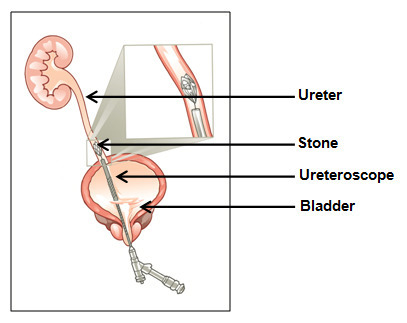
Ureteric stone
An irregularly shaped solid mass of crystals that gets stuck in one of your ureters is known as a ureteral stone. Most ureteral stones are small. A large ureteral stone can obstruct the flow of urine from the kidneys to the bladder. This obstruction can cause extreme pain. When minerals and salts accumulate in urine, ureteral stones form. The minerals combine to form crystals, which grow into stones.
There are four main types of ureteral stones, including:
- Calcium oxalate stones
- Uric acid stones
- Struvite stones
- Cystine stones
Symptoms:-
If you have small ureteral stones, you may not experience any symptoms as they move through your urinary system. Stones, on the other hand, that obstruct your ureters or any of the kidney's drainage tubes can cause the following symptoms:
- Severe pain that comes and goes (intermittent) in upper flank
- Abdominal pain that spreads down to lower abdomen
- Pain or a burning feeling while peeing
- Nausea
- Vomiting
- Bloody or discolored pee (brown, pink or red)
- Cloudy pee
- Frequent urges to pee
- Peeing only a small amount of urine
Tests and Treatment:-
The following tests may be recommended by the doctor to confirm the presence of ureteral stones.
- Urinalysis
- Blood test
- Ultrasound
- X-Ray
- CT scan
Treatment:-
The removal of ureteral stones is dependent on their size and location. It also depends on what substances make up the stones.
Treatment options include:
- Shock wave lithotripsy
- Ureteroscopy
- Percutaneous nephrolithotomy
- Ureteral stents
- Medical expulsive therapy (MET)
Make an appointment right away with the best urologist for ureteric stones, Dr Atul Jain.
Call With Doctor